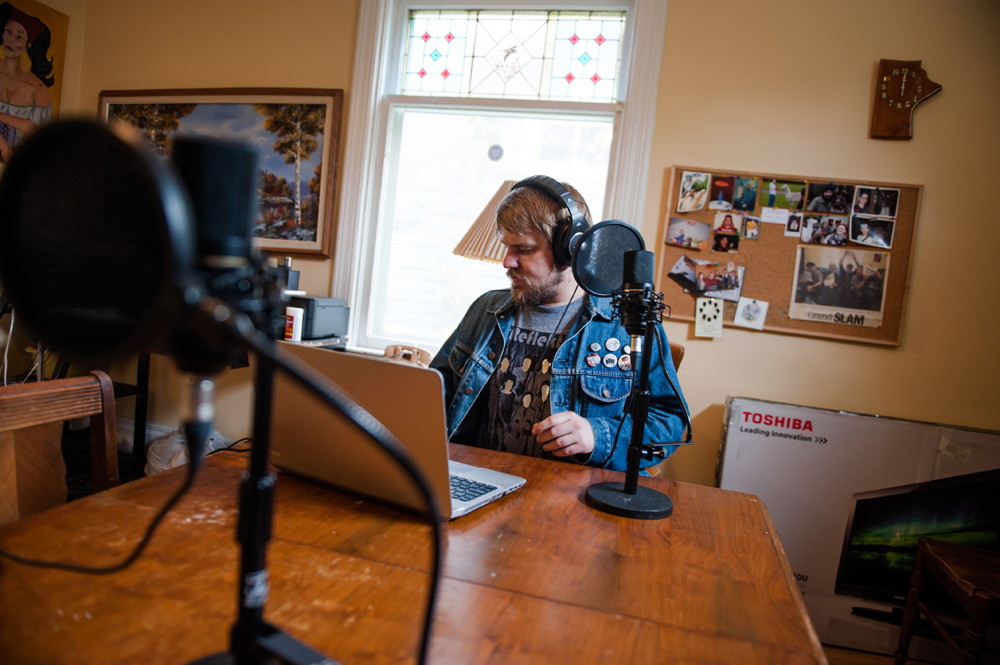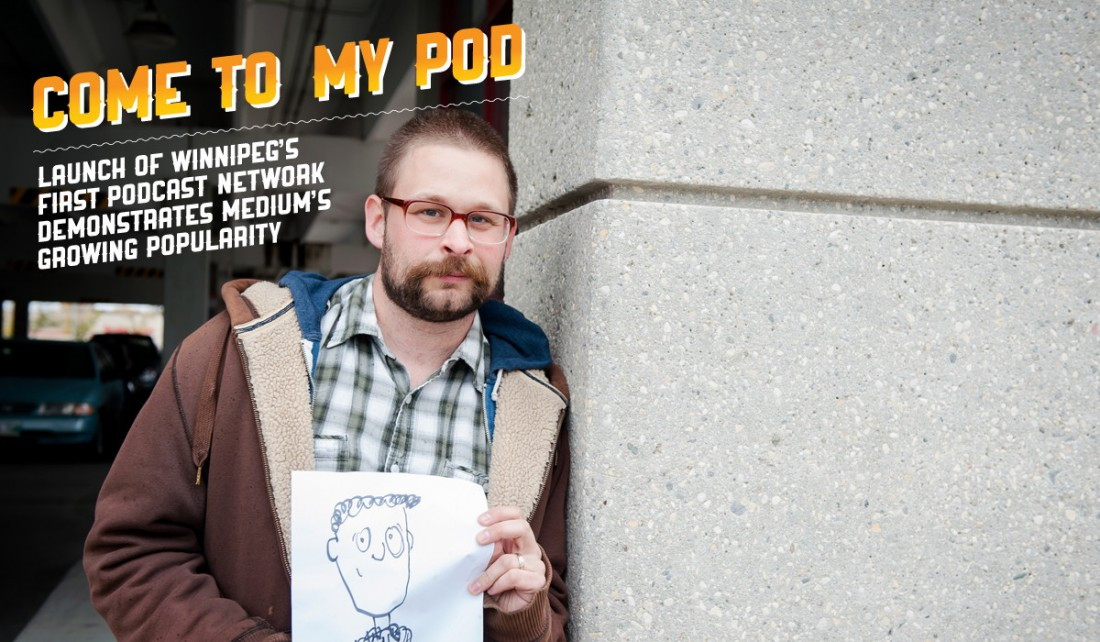Come to my pod
Launch of winnipeg’s first podcast network demonstrates medium’s growing popularity
Less than a decade ago, podcasts were virtually unheard of. A 2005 New York Times article, The Podcast as a New Podium, clumsily outlined the new medium, making it sound about as appealing and mainstream as stamp collecting or CB radio. But with a recent explosion of new shows in Winnipeg, as well as the emergence of the city’s first podcast network last month, it’s becoming abundantly clear that podcasting is no longer the medium of the future: it’s the medium of the present.
For the uninitiated: Merriam-Webster defines a podcast as “a program (as of music or talk) made available in digital format for automatic download over the Internet”. They’re essentially downloadable radio shows. Unlike radio, they can be listened to at any time and remain unrestricted by episode length or on-air censorship standards. Most importantly, podcasts aren’t the domain of professional broadcast journalism. Anyone with the desire to talk on-air can host a podcast.
This September saw the launch of the Garbage Hill Network by local podcaster Devin Bray. Bray, 25, cohosts Couch Surfin’ with Terrance Williams, and is a student in social work at Herzing College. Bray says that he was inspired by more established podcast networks, such as Earwolf (Comedy Bang Bang, Topics) and Nerdist Industries (Big Pop Fun, Sex Nerd Sandra).
“ All you have to do is sign up, buy a microphone, and hit record.
Terrance Williams, co-host of Couch Surfin’
“I wanted to have a place that you could point to in Winnipeg and say, ‘That’s the podcast community,’” Bray tells me in the living room of his apartment, where he and Williams record the show with a single coffee table microphone. “In music, you can easily point to a particular show or scene and see everything that, say, Winnipeg metal or punk has to offer. This is just a quick way for people to look and see, ‘Here’s something I might like.’”
Other shows on the network include Warped and Creased, Change of Address, Loose Ropes Wrestling and Witchpolice Radio. Bray says that he’s always looking for new shows to join the network.
“The idea is to eventually have a really well-rounded roster. A Jets cast, a comics show, a movie show, music stuff, wrestling stuff, anything. I’m not producing the shows, I’m just facilitating an audience. We’re not making any money off it. It’s a collective, a network in the purest sense.”
Bray and his cohorts aren’t flogging a dead horse. The popularity and ubiquity of podcasting has grown immensely in recent years. CBC Radio makes most of its shows available as podcasts, with Q with Jian Ghomeshi and The Vinyl Café regularly topping the iTunes podcasting charts. With podcasts like WTF with Marc Maron and Comedy Bang Bang spinning off into television shows, or This American Life and The Tobolowsky Files breaking into public radio and feature films, the medium clearly has genuine cultural cachet.
Smaller traditional broadcasters, like the University of Manitoba’s UMFM, have made podcasting an integral part of its platform. James Borsa has hosted Ultrasonic Film on UMFM since September 1998 and has interviewed everyone from director David Cronenberg to actor Michael Biehn. Borsa says that his show’s availability as a podcast has broadened his listenership and made the show more accessible.
“That’s the great thing about the podcast,” Borsa says. “Through websites like PodOmatic, I can track the number of people who are listening to the show, downloading it, visiting the page. I didn’t have that ability prior to the Internet.”
Loose Ropes Wrestling, another UMFM show available as a podcast, also utilizes its online status to find an audience for a show with a fairly niche subject matter.
“Wrestling is so expansive,” co-host James Korba says. “We can talk about mainstream stuff, but still focus on local and independent stuff as well. We managed to get wrestler Matt Taven as a guest, who’s on the rise in the American independent scene.”
“In addition to mainstream wrestling in the US, there’s also big wrestling in Mexico and specifically in Japan,” co-host Adam Giardino adds. “We have an upcoming episode where we’re discussing this underground wrestling league we uncovered in Japan. With the Internet you can definitely find anything and everything about wrestling if you really look for it.”
Warped & Creased is another example that uses its online platform to create a niche show that couldn’t exist on mainstream radio: two audiophiles discussing the ins-and-outs of record collecting.
“There might be other shows that talk about music or records,” says co-host Andrew Murenko, “but there aren’t many shows that talk about the kind of music we listen to.” The show has a focus on heavy music, ambient post-rock, and other more avant-garde genres.
In addition to music itself, the hosts discuss the logistics of maintaining a record collection.
“Living in Canada, we have a lot of issues when it comes to shipping and distribution,” says co-host Tyler Morrison. We jump a lot of hurdles, we make a lot of sacrifices for our collections, and I think it’s something worth talking about.”
Morrison and Murenko’s audiophilia extends to the recording of the show itself, which they ensure goes out sounding pristine. But every podcaster uses a different DIY recording setup. From Couch Surfin’s lone mic to Warped & Creased’s professional setup, there’s no right or wrong way to podcast.
“We record in [co-host] Jon Askholm’s basement,” says Witchpolice Radio co-host Sam Thompson. “He has a jamspace down there, which works well for what we’re doing.” Witchpolice focuses on local bands of past and present (Thompson and Askholm were two-thirds of Winnipeg avant-garde noise-punkers The Mouth Boat). “We have speakers and drums set up so we can have live performances by guests. There are blankets all over the walls. People have described it as a blanket fort. I don’t know if it soundproofs it at all, but it looks cool.”
The DIY, punk rock approach to recording podcasts goes beyond the recording methods. With the increased number of shows in the city, many hosts are trying to put a focus on the community of podcasters and their listeners, both locally and across the Internet.

Matt Moskal, host of The Supporting Act
Matt Moskal, host of The Supporting Act, makes it a goal to illuminate local artists. The mission statement of the show is to “illuminate the careers of musicians, comedians, performers, and artists just a bit shy of the mainstream spotlight.”
“When I started the show, I had just moved to Winnipeg,” Moskal says. “I started in Sudbury, Ontario which is where I thought my journalism career was going to take off. Surprise, it didn’t. But I realized that I live in the same city as Kevin McDonald, as Fred Penner, as John K. Samson, as Imaginary Cities, and these are all people who are important to our culture.”
Sandra D. Sanchez co-hosted Return to Sender from March 2010 to November 2013 before starting her own show, Change of Address. She says that her dedicated fanbase of listeners are essential to her show, which regularly features fan-submitted guest contributions.
“We had a few people who wanted to share their point-of-view as well,” says Sanchez, whose show provides a comedic and confessional look at her life as a mother, a lesbian, and a mail carrier. “They’d ask questions or just share parts of their life. Right now I have a woman contributing from Ontario about her international adoption story.”
Over the course of both her shows, Sanchez has outlined her own personal story, including the process of becoming a mom. “Sperm donation is a weird, gross process, and we’re trying for baby number two right now,” Sanchez says. “And I feel like it’s my job, on the podcast, to answer anyone’s questions, no matter how stupid they are. I want to make sure that anyone wanting to know, say, how lesbians have a baby finds out. That’s my small way of advocating.”
All of these people are proof that anyone, despite their personal background or lack of broadcast experience, can have success in podcasting. With the community in Winnipeg growing, podcasters are hopeful and enthusiastic that more individuals will take up the call.
“I urge anyone reading this to start a podcast,” Moskal says. “If you care about something, if you have the ambition, if you have a voice to be heard, do it.”
Bray says he’s excited any time a new local show springs up, and encourages them to get in contact with Garbage Hill. “It’s not super polished, it doesn’t cost anything, but you’re only benefitting from it. Other podcasts aren’t our competition. TV and the radio are our competition. If you’re listening to or creating a podcast, you’re supporting the medium, and that’s great.”
Co-host Williams agrees. “A guy at Bar Italia recognized me from the show. He told me he and his friends wanted to start a podcast, and I told him, ‘Instead of telling me, take that energy and do it.’ All you have to do is sign up, buy a microphone, and hit record.”
Visit garbagehillnetwork.com to check out some great local podcasts.
Published in Volume 69, Number 6 of The Uniter (October 8, 2014)







